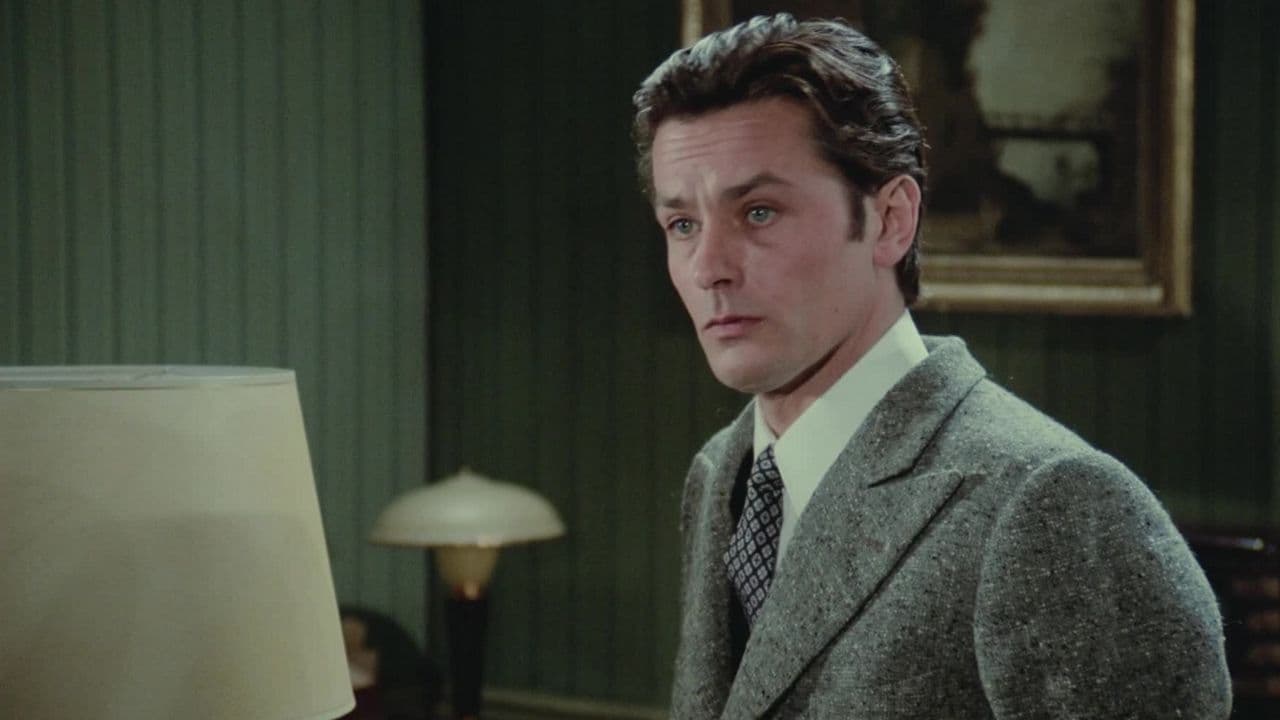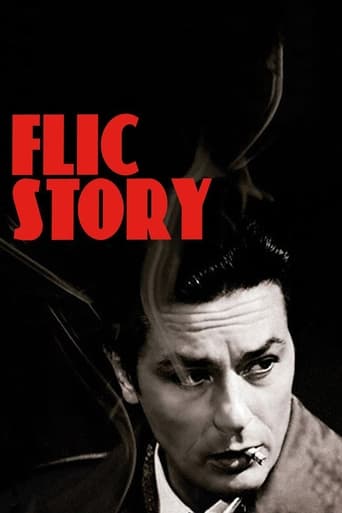Protraph
Lack of good storyline.
Kidskycom
It's funny watching the elements come together in this complicated scam. On one hand, the set-up isn't quite as complex as it seems, but there's an easy sense of fun in every exchange.
Anoushka Slater
While it doesn't offer any answers, it both thrills and makes you think.
Hayleigh Joseph
This is ultimately a movie about the very bad things that can happen when we don't address our unease, when we just try to brush it off, whether that's to fit in or to preserve our self-image.
Kirpianuscus
one of films who are more than a good one. because it gives more than good story, inspired performances, tension or credible dialogues. first - it is an admirable thriller. than - the work of Jean -Louis Trintignan is impressive , because he does a not real comfortable role in a subtle manner. the presence on screen, in same film of Ranato Salvatori and Anton Delon reminds the air of Rocco and his brothers by Visconti and that detail is important for a part of public. not the least, it is a real story who has the chance to be presented in the right manner, the atmosphere being recreated in wise manner. a film who has useful demonstration of few legendary actors. and who suggest a kind of portrait's sketch of evil.in same measure, the scenes behind Buisson's catchment and the habits after the moments of Borniche and Buisson are more than interesting.
jotix100
It is 1947 in France, right after the end of WWII. A police lieutenant, Roger Borniche, works hard chasing criminals. Nothing prepares him for what awaits him in his pursue of Emile Buisson, a convict that gets released from jail, only to pick up the bad habits that landed him in prison. With his brother, Jean-Baptiste, and the band he puts together, Emile will become one of the most dangerous men in the country.Borniche, who narrates the story, made it his personal crusade to apprehend Buisson. Borniche did not like the way some of the methods used by his colleagues, he believed in doing his job with dignity. In the meantime, Buisson terrorized Paris. Trying to get the man, Borniche puts himself in danger. Ultimately, the detective is lucky in pressuring one of Buisson's gang members, and with his help, he is able to corner Buisson in a country inn that served as his hideout, not before putting himself, his wife and two associates in danger.Never having seen this 1975 entry, we thought it was a rerun of the much better "Un flic" directed by Jean-Pierre Melville. The picture, directed by Jacques Deray, was based on a real incident, the personal account of the real police at the center of the story, Roger Borniche, and adapted for the cinema by the director and Alphonse Boudard. It was clearly an Alain Delon vehicle, who was at the height of his film career. The actor does not disappoint with his take on the policeman.Jean-Louis Trintingant appears as Buisson. The role presented good opportunities for this actor playing against type. Mr. Trintingnant made an excellent contribution to our enjoyment of the film. Also in the cast, Renato Salvatori, playing a friend of Buisson. Claudine Auger is Catherine, the wife of Borniche. Jacques Marin shows up briefly as the innkeeper where Buisson is captured.
thegreatswan
For those who didn't know the criminal history of France : Emile Buisson, born in 1902, started his robbers' life during the 30's, with his older brother. He get married, but his wife and their child died while he was in jail. And after this tragedy, Buisson became a killer. From jailhouses to asylums, Buisson finally escaped in 1947. For three years, almost 20 people were murdered, coldly, brutally shot by Emile. All victims of robberies, or thieves suspected for betraying Buisson. He was the first one in France to be called "P.E.n°1". It's these three years which are counted in "Flic Story". The young inspector Borniche had a lot of work to do in order to arrest Buisson. And he succeeded in 1950. And that wasn't the end. For four years, every crime was studied, dissected. In 1954, Buisson was condemned to die. Twice. On the dawn of February 28th, 1956, in the Santé Prison, M.Obrecht, the executioner, released the guillotine's chopper on Buisson's neck.But if Borniche hadn't wrote his book, nobody would even remember about Buisson. The book is really good. So is the movie. Trintignant is probably too cute to play Buisson, but he gives a real performance : a real dead cold assassin. You have to like Delon, of course, even if he is great as Borniche ! (I think he is unbearable !) A good police movie !
Alice Liddel
'Flic' in French is slang for cop, and 'Flic Story' is a standard issue police procedural - a maverick police inspector attempts to track down the paranoid, trigger-happy psycho leader of a gang of thieves. This kind of thing was enormously successful in France during the 1970s, and 'Flic' follows the usual pattern: the dogged, even exhausting groundwork of bureaucracy and investigation, punctuated by bursts of violence.
The film is based on a book by the hero, and the plot is offered as his narrative through voiceover, with the film controlled by him, the random shocks of a criminal mind and senseless disorder reassuringly contained. Of course, this is a French crime movie, so it doesn't quite work out that way. For a start, Roger Borniche, the police detective, may control the narrative AFTER THE FACT, but within it he is helpless most of the time, and despite his evident brilliance and superiority, he is not quick enough to avert a string of gratuitous murders.Even when he finally succeeds in catching the killer, Emile Buisson, the latter eludes his grasp. Not literally; the poor maniac is duly executed. But the reassertion of order that should come about with his capture doesn't quite; there is no exorcism of evil, triumph of good. Roger is startled by the sheer banality of his nemesis as he watches him handcuffed, reading the rightist paper 'Le Figaro' , drinking wine. Words like 'psycho' and 'poor maniac' are hopelessly inadequate. The film ends with a vanishing trick, Buisson disappearing from the spot to which he was handcuffed. This, of course, is an effect of memory - Buisson is literally not there, he's been killed. But it's as if Roger has had him, but he couldn't catch him, couldn't grab all the things he was supposed to represent.
This ghostly ending echoes the sequence of climactic capture. The scene is the culmination of the genre narrative, the whole point of the plot - excitement, tension, purpose and economy should be at their tantalising pitch. And yet this climax seems to suspend itself from its plot - the rarefied country setting after the Parisian man hunts; the 'disguises' worn by the policemen, and the parts they play; the measured camerawork as Catherine, Roger's fiancee, plays Edith Piaf on the piano to the 'monster''s rapt attention, all create a haunting stillness quite at odds with genre requirements.Further, the film is set in 1947, less than half a decade after the Occupation, during which the police were stooges of the SS. This ambiguity is carried over here, the villain's random violence contrasted with the systematic brutality of police 'questioning'. The police are frequently compared to the Gestapo; Roger may protest at his colleagues' sadism, but he looks on; in one particularly nasty scene, he is like a dead man, staring, his unpuffed cigarette eating itself up into ashes like his soul. Both hero and villain have interesting relationships with the Occupation that further complicate their generic roles.This film is deliberately populist, conceived as an Alain Delon star vehicle. But it alludes to one of Delon's most famous films, 'Le Samourai', and uses some of Melville's techniques (his last work, also starring Delon as the title character, was called 'Un Flic'), which, in his films, were used to ends antipathetic to populism. The most obvious allusion is the Metro scene where Delon/Roger and an enemy engage in a cat and mouse game.
More profoundly, Deray fragments his characters visually: Roger, even though the roles are reversed and he is the law-backed hunter, is repeatedly shot as a pair of feet; Buisson the killer is never framed in the same shot as his murder weapon, the shooting is always fragmented, as if it is apart from him, or as if the phallic power conferred by shooting is denied him; it is suggested that his 'psychosis' is linked to sexual neurosis, even suppressed homosexuality. Roger is not free from this either; unlike 'Samourai''s Jef Costello, he seems to have a stable domestic life, but he and his lover sleep in separate rooms, and he is willing to sacrifice her as bait in a potentially lethal sting. With her red hair, she is tacitly linked to the gangsters' moll.Of course, comparing 'Flic Story' to 'Le Samourai' only emphasises Melville's genius. Deray copies Melville's downbeat style and rigorous emphasis on doing things (lots of shots of people just walking, etc.), but these are only superficials. He has little sense of composition or rhythm through montage, never mind the latent metaphysical power of Melville. This leaves the 'slow' bits tedious where they are compelling in Melville, and often unrelated to character. Paris looks lovely, though.

